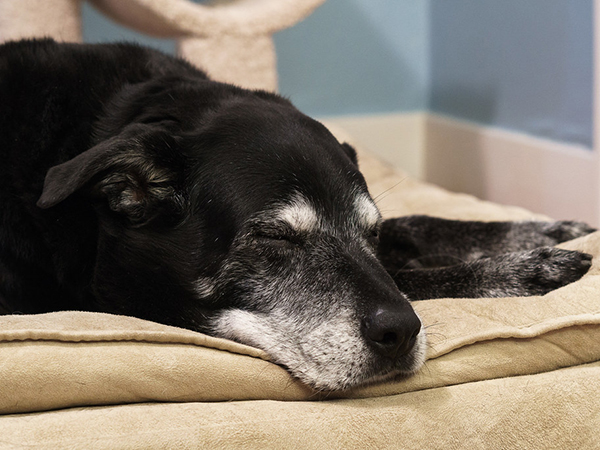Spotting the Early Signs of Dementia in Your Aging Dog
|
Feb 28, 2024 - By the dedicated team of editors and writers at Newsletter Station.

|
As our beloved canine companions age, they may face a variety of health challenges, including cognitive dysfunction syndrome, often referred to as dementia in dogs. Just like in humans, dementia can be a challenging condition for both dogs and their owners.
Recognizing the early signs of dementia in your aging dog is crucial, as it allows for early intervention and improved quality of life. In this blog, we'll discuss the signs to watch for and what you can do to support your furry friend through this challenging time.
Understanding Canine Dementia
Canine cognitive dysfunction syndrome (CDS), commonly known as doggy dementia, is a neurological condition that affects a dog's cognitive function as they age. It is similar to Alzheimer's disease in humans and can lead to memory loss, confusion, disorientation, and behavioral changes in dogs.
Early Signs of Canine Dementia
- Changes in Sleep Patterns:
Dogs with dementia may experience disruptions in their sleep-wake cycle. They may sleep more during the day and become restless at night, pacing or whining.
- Altered House Training:
One of the earliest signs of dementia in dogs is forgetting their house training. Even if they were previously well-trained, accidents inside the house can become more frequent.
- Disorientation and Confusion:
Dogs with dementia may seem disoriented in familiar surroundings. They may get stuck in corners, forget where they are, or appear confused about their surroundings.
- Reduced Interest in Play and Interaction:
Dogs with CDS may lose interest in toys, games, and social interactions. They might withdraw from their favorite activities and become less responsive to their owners.
- Changes in Behavior:
Dementia can change your dog's behavior. They may become more anxious, agitated, or aggressive. Some dogs may also become more clingy, seeking constant reassurance.
- Loss of Appetite or Increased Hunger:
Changes in appetite are common in dogs with dementia. Some may lose interest in food, while others may appear to be hungry all the time.
- Repetitive Behaviors:
Dogs with CDS may exhibit repetitive behaviors such as pacing, licking, or circling, often without apparent reason.
- Vocalization: Excessive barking, whining, or howling can be another symptom of dementia in dogs, especially at night.
What to Do If You Suspect Dementia
If you notice any of these early signs in your aging dog, it's essential to consult with your veterinarian promptly. Your vet can rule out other potential causes of these symptoms, such as medical issues or pain, and confirm a diagnosis of canine dementia.
Managing Canine Dementia
While there is no cure for canine dementia, there are several strategies you can employ to support your aging dog:
- Medication:
Your veterinarian may prescribe medications like selegiline or other cognitive-enhancing drugs that can help manage the symptoms and slow the progression of the disease.
- Diet and Supplements:
A balanced diet rich in antioxidants and omega-3 fatty acids can support brain health. Discuss dietary options and supplements with your vet.
- Environmental Adaptations:
Make your home more dementia-friendly by minimizing hazards, using baby gates if necessary, and creating a consistent routine.
- Mental Stimulation:
Engage your dog in mentally stimulating activities like puzzle toys, obedience training, and short walks to help keep their brain active.
- Routine and Comfort:
Maintain a consistent routine and provide a comfortable, quiet place for your dog to rest.
- Patience and Love:
Offer your dog plenty of love, patience, and understanding as they navigate the challenges of dementia. Be prepared for changes in behavior and adapt accordingly.
Spotting the early signs of dementia in your aging dog is essential for their well-being. With the proper support, patience, and care, you can help your furry friends maintain a good quality of life as they age.
Always consult with your veterinarian for guidance on managing canine dementia and providing the best possible care for your beloved pet.
Unlock the Power of Email Marketing
Harness the potential of email marketing with Newsletter Station. Reach your target audience, drive conversions, and achieve your business goals.
|
More Blogs
| May 8, 2024 |
How to Protect Your Dog's Paws: Tips for a Happy and Healthy Furry Friend
|
| May 1, 2024 |
Tips for Removing a Tick from Your Pet
|
| Apr 24, 2024 |
How to Know When It Is Too Hot to Walk Your Dog
|
| Apr 17, 2024 |
What to Do When Your Pet Isn't Eating
|
| Apr 10, 2024 |
What Causes Bad Breath in Dogs and Cats?
|
| Apr 3, 2024 |
What Causes Cysts in Dogs: Understanding Canine Cyst Formation
|
| Mar 26, 2024 |
Toxic Plants for Cats: Protecting Your Feline Friends
|
| Mar 20, 2024 |
Reasons Your Dog Is Licking Its Paws
|
| Mar 13, 2024 |
Ways to Deal with Dog Separation Anxiety
|
| Mar 6, 2024 |
Identifying Food Allergies in Dogs and Cats
|
| Feb 28, 2024 |
Spotting the Early Signs of Dementia in Your Aging Dog
|
| Feb 21, 2024 |
How Safe is Pet Hair Dye?
|
|
|
|